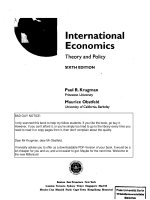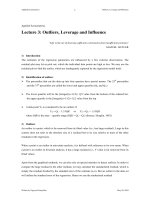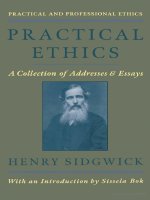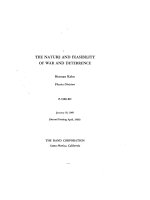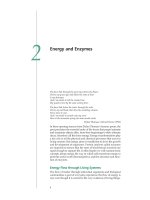Salt and Light docx
Bạn đang xem bản rút gọn của tài liệu. Xem và tải ngay bản đầy đủ của tài liệu tại đây (561.47 KB, 174 trang )
Eberhard Arnold
Foreword by Jürgen Moltmann
Living the Sermon
on the Mount
Salt Light
and
SaltandLight
Livingthe
SermonontheMount
Eberhard Arnold
Foreword by Jürgen Moltmann
e Plough Publishing House
Please share a link to this e-book with your friends. Feel free to post and
share links to this e-book, or you may e-mail or print this book in its
entirety or in part, but please do not alter it in any way, and please do not
post or oer copies of this e-book for download on another website or
through another Internet-based download service. If you wish to make
multiple hard copies for wider distribution, or to reprint portions in a
newsletter or periodical, please observe the following restrictions:
• You may not reproduce it for commercial gain.
• You must include this credit line: “Copyright 2012 by
The Plough Publishing House. Used with permission.”
This e-book is a publication of The Plough Publishing House,
Rifton, NY and Robertsbridge, England, www.plough.com.
(-): ---
(-): ----
Chapters ve, six, and seven of the Gospel of Matthew have been reprinted from
the Revised Standard Version of the Bible, © , , by Division of Christian
Education of the National Council of Churches. Used with permission.
e verses quoted at the end of e Fight Against Mammon (James :–) have
been reprinted from Holy Bible, New International Version, ©, , , by
International Bible Society. Used by permission of International Bible Society.
All other Bible quotations were freely quoted in German by the author and trans-
lated by the editors.
Cover photograph: Barry Winiker/Photolibrary/Getty Images.
W
to the Sermon on the Mount and
perhaps have understood it. But who has heard it
aright? Jesus gives the answer at the end (Matt. :–).
He does not allow his hearers to go away and make of his
sayings what they will, picking and choosing from them
whatever they nd helpful and testing them to see if they
work. He does not give them free rein to misuse his word
with their mercenary hands, but gives it to them on condi-
tion that it retains exclusive power over them.
Humanly speaking, we could understand and inter-
pret the Sermon on the Mount in a thousand dierent
ways. Jesus knows only one possibility: simple surrender
and obedience, not interpreting it or applying it, but doing
and obeying it. at is the only way to hear his word. He
does not mean that it is to be discussed as an ideal; he really
means us to get on with it.
Dietrich Bonhoeer
To the Reader
Salt and Light became a book many years aer Eberhard
Arnold’s death. Its chapters were compiled and translated
by members of the Bruderhof communities from arti-
cles, talks, and lectures from the years –. Arnold
grappled with the Sermon on the Mount his whole adult
life. His relentless faithfulness to its demands bore prac-
tical fruit in a community movement that is still thriving
today. Although Arnold was addressing a Germany in
political and social ferment, his words are not bound to
time and place. ey direct us out of our bankruptcy to a
new, revolutionary way.
Contents
ix Foreword
xiii Introduction
xxi e Sermon on the Mount (Matthew –)
1 Not a New Law
3 Becoming True Men and Women
9 Salt and Light
17 Happiness
23 e Nature of the New Justice
33 “But I Say to You…”
37 Away from Compromise and Shadow
43 Against Bloodshed and Violence
51 e Better Righteousness
55 God or Mammon
59 e Fight Against Mammon
73 Mammon and the Living God
99
e Decision
111 Resistance by Surrender
121 e Spirit of Life Overcomes
131 Present Experience, Future Kingdom
143 e Joyful News of the Kingdom
viii
Foreword
T
with the question, “How do we
respond to the Sermon on the Mount?” – a question
that must be asked by each new generation. Each gener-
ation must nd its own answer to the call of Jesus. Yet
throughout the centuries there is a fellowship of those
who face the powerful challenge of the Sermon on the
Mount without reservation, ready for unconditional
discipleship. Among those who speak to us today are the
Waldensians and Hussites, the Baptizers and the Hutter-
ites, the Mennonites and Quakers, and now Eberhard
Arnold of the Bruderhof. On the way of Jesus, however,
intervals of time lose their meaning; brothers and sisters
of earlier days speak to us as if they were present today –
which they are, if we listen to them and through their
voices hear the voice of Jesus.
As I was reading Arnold’s vision of the Sermon on
the Mount and imagining the rst Bruderhof – a lonely,
impoverished little settlement in the Rhön hills – I was
suddenly struck by the inseparable connection between
Jesus’ words and unconditional discipleship, between
discipleship and the communal life of the Twelve, between
the life of brotherly love and the expectation of God’s
kingdom on earth. ese things must never be separated.
Arnold shows us that the Sermon on the Mount is
not a new moral law but a proclamation, a witness to
ix
x
SALT AND LIGHT
the power of the coming kingdom and true life. e
Beatitudes come before Jesus’ new commandments.
Before laying the yoke of discipleship upon us, Jesus lls
our hearts with the powers of God’s spirit. Arnold shows
us that following these commandments consistently is
neither an ideal nor an ordeal, but a matter of course in
the community of Jesus. In the community of Jesus, life
becomes clear, simple, decisive, and unequivocal. Gone
are the many doubts and compromises, the many half-
truths and the half-heartedness. We can only love God
with our whole heart and strength; we can follow Jesus
only with undivided dedication – otherwise we are not
following him at all.
Arnold shows us further that discipleship and com-
munity life belong together: they cannot be separated. It
is from community life that we draw the strength for dis-
cipleship and courage to face the inevitable opposition.
In discipleship we nd our brothers and sisters of the
communal life. e Bruderhof community proves that.
I ask myself what the state churches, still trying to lead a
Christian life, can learn from such consistently Christian
communities. First of all we have to lay down our old prej-
udices and heretic-hunting. e closely related Menn-
onite and Hutterite groups have never – neither in the
past nor today – been fanatic enthusiasts or narrow sec-
tarians, but genuine Christian communities. True, their
existence represents a criticism of the life of Christians
xi
FOREWORD
in the established churches. e answer will be to begin
learning from them. So I have been asking myself,
how can the established institutional church become a
living, communal church? How can our church parishes
become communities of faith and of life? I believe that
this is the way into the future, and I see more and more
people going in that direction. We are not looking for
the self-righteous Christian sect that despises the world,
but for the open church of the coming kingdom of God.
is church is open and welcomes everyone, like the
Bruderhof does. It is open to the poor, the handicapped,
and the rejected, who nd a refuge and new hope there
because they nd Jesus.
Arnold places much emphasis on the realism of
Christian hope: Christians do not hope for salvation for
their souls in the hereaer, but pray, as Jesus bids us: “y
kingdom come!” Arnold has oen called this coming
kingdom “God’s future state.” Like the New Testament,
he speaks of “the heavenly city” and “the heavenly polit-
euma.” He speaks of the kingdom that is to come to earth
in political terms. at is very important to me: if I pray
for the advent of this kingdom, I cannot abandon the
earth to wars and ecological destruction and to those who
hope for security by threatening such disasters. If I pray
for the coming of God’s kingdom, I cannot stand by while
the environment and my fellow creatures are being anni-
hilated through the progress of civilization and nuclear
xii
SALT AND LIGHT
power stations. Praying for the coming of God’s kingdom
calls for a decisive resistance to the destruction of the
earth. In his hope Arnold was as earthly, physical, and
holistic as Christoph Blumhardt was.
Arnold once called the Bruderhof “a seed of God’s
kingdom.” During the Nazi years this seed “died” like the
buried grain of seed the apostles speak of. But it has also
borne – and is bearing – rich fruits, not the least of which
is hope. e Bruderhofs, like all faith-based commu-
nities and fellowships, are lights of hope in an age that
sometimes looks very dark. May they no longer remain
“hidden under a bushel,” but be heeded more and more
by the rest of us.
Jürgen Moltmann
Tübingen, Germany
Introduction
T
known about him today, Eberhard
Arnold (–) was widely sought aer during
his lifetime as a public speaker, lecturer, and publisher
in his native Germany. During and aer his studies at
Breslau, Halle, and Erlangen (where he received his
doctorate in ), he was active in the student revival
movement then sweeping those towns and became secre-
tary of the German Christian Student Union. In he
became literary director of the Furche Publishing House
in Berlin, and editor of its monthly periodical.
Like thousands of young Germans in the s,
Eberhard and his wife Emmy were disillusioned by the
failure of the establishment – especially the churches – to
provide answers to the problems of society in the turbu-
lent years following World War I. In their seeking, they
were inuenced by the German Youth Movement (in
which Eberhard was a nationally-known participant), the
German pastor Johann Christoph Blumhardt and his son
Christoph Friedrich, the sixteenth-century Anabaptists,
and, most signicantly, the early Christians.
Eberhard has described this time of serious seeking in
this way:
I would like to tell about my personal seeking. A group
of young people oen gathered around me, and I tried by
xiii
xiv
SALT AND LIGHT
means of Bible studies and talks to lead people to Jesus.
But aer a while this was no longer enough. I found
myself in a very dicult situation, and I was deeply
unhappy. I began to recognize the needs of people in
a deeper way: the need of their bodies and souls, their
material and social need, their humiliation, exploitation,
and enslavement. I recognized the tremendous power of
mammon, discord, hate, and violence, and saw the hard
boot of the oppressor upon the neck of the oppressed. If a
person has not experienced these things, he might think
such words an exaggeration –but these are the facts.
en, from to , I sought painfully for a deep
understanding of the truth. I recognized more and
more that personal dedication to people’s souls was
not all that Jesus asked – that it did not fully express the
being of God. I felt that I was not fullling God’s will by
approaching people with a purely personal Christianity
and concerning myself with individuals so that they,
like myself, might come to this personal Christianity.
During those four years I went through a hard struggle.
I searched not only in the old writings, in Jesus’ Sermon
on the Mount and other scriptures, but I also wanted to
get to know the life of the working classes – the oppressed
humanity of the present social order – and to share in
their life. I wanted to nd a way that corresponded to
the way of Jesus, of Francis of Assisi, and also the way of
the prophets.
xv
INTRODUCTION
Shortly before the outbreak of the war [World War I], I
wrote to a friend saying that I could not go on like this. I
had interested myself in individuals, preached the gospel,
and endeavored in this way to follow Jesus. But I had to
nd a way actually to serve humankind; I wanted a dedi-
cation that would establish a tangible reality by which
men could recognize the cause for which Jesus died.
e war continued and we saw ever greater horrors.
We saw the condition of the men who came back home.
One young ocer came home with both his legs shot o.
Returning to his ancée, he hoped to receive the loving
care he so badly needed from her, but she informed him
that she had become engaged to a man with a healthy
body.
en hunger came to Berlin. People ate turnips morn-
ing, noon, and night. When the people turned to the
ocials for money or food, they were told, “If you are
hungry, eat turnips!” On the other hand, even in the
middle of Berlin there were still well-to-do “Christian”
families who had a cow and had milk when no one else
did. Carts went through the streets bearing the bodies
of children who had died. e bodies were wrapped in
newspaper, for there was neither time nor money for
a con. In I saw a horse collapse in the street: the
driver was knocked aside by the starving people, who
rushed to cut chunks from the warm body to bring home
to their families.
xvi
SALT AND LIGHT
During this time I visited a poor woman in a basement
dwelling. Water was running down the walls of her cellar
room. Although she was tubercular, her relatives were
living in the same room with her. One could hardly have
the window open because dirt would be kicked in by the
people walking past in the street above. I oered to nd
her a dierent place to live, but you should have heard
what she said: “I’m not going to make a fool of myself.
I’ll die here where I have lived.” She was a living corpse.
Aer such experiences – and those of the revolutionary
times, when working people were oered huge rooms and
halls with parquet oors –I realized that the whole situ-
ation was unbearable. A leader of the Student Christian
Movement told me that a high government ocial had
agreed to work with me, provided I remain silent on the
social issues: the war and the terrible suering.
In the meetings we had at our home in Berlin, where
we discussed all these things with our friends, it soon
became clear that Jesus’ way is a practical one: he has
shown us a way of life that is more than a way of concern
for the soul. It is a way that simply says, “If you have two
coats, give one to him who has none; give food to the
hungry, and do not turn away your neighbor when he
needs to borrow from you. When you are asked for an
hour’s work, give two. You must strive for his justice. If
you want to found a family, see that all others who want
to found a family are able to do so, too. If you wish for
education, work, and satisfying activity, make these
xvii
INTRODUCTION
possible for other people as well. If you say it is your
duty to care for your health, then accept this duty for the
health of others also. Treat people in the same way that
you would be treated by them. is is the law and the
prophets. Enter through this narrow gate, for it is the way
that leads to the kingdom of God.”
When this became clear to us, we realized that a person
can go this way only when he or she becomes as poor as
a beggar and takes upon himself, as Jesus did, the whole
religious and moral need of mankind. en we bear
suering, and we suer because we see how injustice
rules the world. Our hearts will be undivided only when
we hunger for justice more than for water and bread.
en we will be persecuted for the sake of this justice.
Only then will our righteousness be greater than that
of the moralists and theologians. We will be lled with
a new re and a new spirit and warmth from the vital
energy of God because we have received the Holy Spirit.
In this connection it became clear to us that the rst
Christian community in Jerusalem was more than a
historical happening: it was here that the Sermon on the
Mount came to life. We saw that it was more necessary
than ever to renounce the last vestiges of privileges and
rights and to let ourselves be won for this way of total
love: the love that will pour itself out over the land from
the breath of the Holy Spirit, the love that was born out
of the rst church community.
xviii
SALT AND LIGHT
So we felt that we could not endure the life we were
living any longer. We had to witness to the fact that Jesus
concerned himself not only with people’s souls but with
their bodies as well. He made the blind see, the lame
walk, and the deaf hear. And he prophesied a kingdom,
a rule of God which was to change completely the condi-
tions and the order of the world and make them new. To
acknowledge this and live according to it – this, I believe,
is God’s command for the hour.
In , out of a burning desire to practice the demands
of the Sermon on the Mount, the Arnolds with their ve
children and a few other people began a communal life in
the village of Sannerz. e community, which supported
itself by agriculture and a small but vibrant publishing
house, attracted thousands of visitors and grew quickly.
By the house in Sannerz had become too small, and
the next year a new Bruderhof (place of brothers) was
started in the nearby Rhön hills.
e s brought persecution by the National Social-
ist regime and expulsion from Germany. Aer a tempo-
rary stay in the neighboring country of Liechtenstein, the
Bruderhof members ed to England, where they estab-
lished a new community. Here the rst major undertaking
of the publishing house was the translation of several of
Eberhard Arnold’s most important works, including some
of the articles and talks in this volume. World War II
drove the Bruderhof to Paraguay in , and in the
xix
INTRODUCTION
rst Bruderhof was established in the United States. Now,
with our world in no less critical condition than when
Eberhard Arnold wrote these words, we oer you this
volume, arming with him:
We believe in this new birth – a life of light from God.
We believe in a future of love and constructive fellow-
ship. We believe in the peace of God’s kingdom, and that
he will come to this earth. is faith does not mean we
are imagining things only for the future – God will bring
this future and give us his heart and spirit today. Christ
lives in his church, which is the hidden, living seed of
the future kingdom. e peace that is characteristic of
the church and the love-spirit of the future have been
entrusted to her. erefore she shows herself in the
present as justice, peace, and joy in this world.
e Editors,
The Sermon on the Mount
Matthew 5–7
S
, he went up on the mountain,
and when he sat down his disciples came to him. And
he opened his mouth and taught them, saying:
Blessed are the poor in spirit, for theirs is the kingdom
of heaven.
Blessed are those who mourn, for they shall be comforted.
Blessed are the meek, for they shall inherit the earth.
Blessed are those who hunger and thirst for righteous-
ness, for they shall be satised.
Blessed are the merciful, for they shall obtain mercy.
Blessed are the pure in heart, for they shall see God.
Blessed are the peacemakers, for they shall be called sons
of God.
Blessed are those who are persecuted for righteousness’
sake, for theirs is the kingdom of heaven.
Blessed are you when men revile you and persecute you
and utter all kinds of evil against you falsely on my
account. Rejoice and be glad, for your reward is great
in heaven, for so men persecuted the prophets who
were before you.
You are the salt of the earth; but if the salt has lost its
taste, how shall its saltness be restored? It is no longer
xxi
xxii
SALT AND LIGHT
good for anything except to be thrown out and trodden
under foot by men.
You are the light of the world. A city set on a hill
cannot be hid. Nor do men light a lamp and put it under
a bushel, but on a stand, and it gives light to all in the
house. Let your light so shine before men, that they may
see your good works and give glory to your Father who
is in heaven.
ink not that I have come to abolish the law and the
prophets; I have come not to abolish them but to full
them. For truly, I say to you, till heaven and earth pass
away, not an iota, not a dot, will pass from the law until all
is accomplished. Whoever then relaxes one of the least of
these commandments and teaches men so, shall be called
least in the kingdom of heaven; but he who does them
and teaches them shall be called great in the kingdom of
heaven. For I tell you, unless your righteousness exceeds
that of the scribes and Pharisees, you will never enter the
kingdom of heaven.
You have heard that it was said to the men of old, “You
shall not kill; and whoever kills shall be liable to judg-
ment.” But I say to you that every one who is angry with
his brother shall be liable to judgment; whoever insults
his brother shall be liable to the council, and whoever
says, “You fool!” shall be liable to the hell of re. So if you
are oering your gi at the altar, and there remember
that your brother has something against you, leave your
xxiii
THE SERMON ON THE MOUNT
gi there before the altar and go; rst be reconciled to
your brother, and then come and oer your gi. Make
friends quickly with your accuser, while you are going
with him to court, lest your accuser hand you over to
the judge, and the judge to the guard, and you be put in
prison; truly, I say to you, you will never get out till you
have paid the last penny.
You have heard that it was said, “You shall not commit
adultery.” But I say to you that every one who looks at
a woman lustfully has already committed adultery with
her in his heart. If your right eye causes you to sin, pluck
it out and throw it away; it is better that you lose one of
your members than that your whole body be thrown into
hell. And if your right hand causes you to sin, cut it o
and throw it away; it is better that you lose one of your
members than that your whole body go into hell.
It was also said, “Whoever divorces his wife, let him
give her a certicate of divorce.” But I say to you that
every one who divorces his wife, except on the ground
of unchastity, makes her an adulteress; and whoever
marries a divorced woman commits adultery.
Again you have heard that it was said to the men of old,
“You shall not swear falsely, but shall perform to the Lord
what you have sworn.” But I say to you, Do not swear at
all, either by heaven, for it is the throne of God, or by the
earth, for it is his footstool, or by Jerusalem, for it is the
city of the great King. And do not swear by your head,
xxiv
SALT AND LIGHT
for you cannot make one hair white or black. Let what
you say be simply “Yes” or “No”; anything more than this
comes from evil.
You have heard that it was said, “An eye for an eye and
a tooth for a tooth.” But I say to you, Do not resist one
who is evil. But if any one strikes you on the right cheek,
turn to him the other also; and if any one would sue you
and take your coat, let him have your cloak as well; and if
any one forces you to go one mile, go with him two miles.
Give to him who begs from you, and do not refuse him
who would borrow from you.
You have heard that it was said, “You shall love your
neighbor and hate your enemy.” But I say to you, Love
your enemies and pray for those who persecute you, so
that you may be sons of your Father who is in heaven; for
he makes his sun rise on the evil and on the good, and
sends rain on the just and on the unjust. For if you love
those who love you, what reward have you? Do not even
the tax collectors do the same? And if you salute only
your brethren, what more are you doing than others? Do
not even the Gentiles do the same? You, therefore, must
be perfect, as your heavenly Father is perfect.
Beware of practicing your piety before men in order to
be seen by them; for then you will have no reward from
your Father who is in heaven.
us, when you give alms, sound no trumpet before
you, as the hypocrites do in the synagogues and in the
xxv
THE SERMON ON THE MOUNT
streets, that they may be praised by men. Truly, I say to
you, they have their reward. But when you give alms,
do not let your le hand know what your right hand
is doing, so that your alms may be in secret; and your
Father who sees in secret will reward you.
And when you pray, you must not be like the hypo-
crites; for they love to stand and pray in the synagogues
and at the street corners, that they may be seen by men.
Truly, I say to you, they have their reward. But when you
pray, go into your room and shut the door and pray to
your Father who is in secret; and your Father who sees in
secret will reward you.
And in praying do not heap up empty phrases as the
Gentiles do; for they think that they will be heard for their
many words. Do not be like them, for your Father knows
what you need before you ask him. Pray then like this:
Our Father who art in heaven,
Hallowed be thy name.
y kingdom come,
y will be done,
On earth as it is in heaven.
Give us this day our daily bread;
And forgive us our debts,
As we also have forgiven our debtors;
And lead us not into temptation,
But deliver us from evil.
xxvi
SALT AND LIGHT
For if you forgive men their trespasses, your heavenly
Father also will forgive you; but if you do not forgive
men their trespasses, neither will your Father forgive
your trespasses.
And when you fast, do not look dismal, like the hypo-
crites, for they disgure their faces that their fasting
may be seen by men. Truly, I say to you, they have their
reward. But when you fast, anoint your head and wash
your face, that your fasting may not be seen by men but
by your Father who is in secret; and your Father who sees
in secret will reward you.
Do not lay up for yourselves treasures on earth, where
moth and rust consume and where thieves break in and
steal, but lay up for yourselves treasures in heaven, where
neither moth nor rust consumes and where thieves do
not break in and steal. For where your treasure is, there
will your heart be also.
e eye is the lamp of the body. So, if your eye is sound,
your whole body will be full of light; but if your eye is not
sound, your whole body will be full of darkness. If then
the light in you is darkness, how great is the darkness!
No one can serve two masters; for either he will hate
the one and love the other, or he will be devoted to the
one and despise the other. You cannot serve God and
mammon.
erefore I tell you, do not be anxious about your life,
what you shall eat or what you shall drink, nor about
THE SERMON ON THE MOUNT
xxvii
your body, what you shall put on. Is not life more than
food, and the body more than clothing? Look at the
birds of the air: they neither sow nor reap nor gather into
barns, and yet your heavenly Father feeds them. Are you
not of more value than they? And which of you by being
anxious can add one cubit to his span of life? And why
are you anxious about clothing? Consider the lilies of
the eld, how they grow; they neither toil nor spin; yet
I tell you, even Solomon in all his glory was not arrayed
like one of these. But if God so clothes the grass of the
eld, which today is alive and tomorrow is thrown into
the oven, will he not much more clothe you, O men of
little faith? erefore do not be anxious, saying, “What
shall we eat?” or “What shall we drink?” or “What shall
we wear?” For the Gentiles seek all these things; and your
heavenly Father knows that you need them all. But seek
rst his kingdom and his righteousness, and all these
things shall be yours as well.
erefore do not be anxious about tomorrow, for
tomorrow will be anxious for itself. Let the day’s own
trouble be sucient for the day.
Judge not, that you be not judged. For with the judg-
ment you pronounce you will be judged, and the measure
you give will be the measure you get. Why do you see the
speck that is in your brother’s eye, but do not notice the
log that is in your own eye? Or how can you say to your
brother, “Let me take the speck out of your eye,” when


